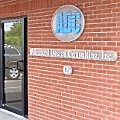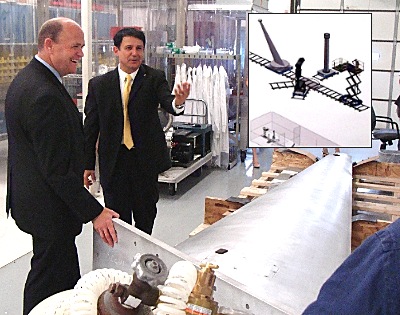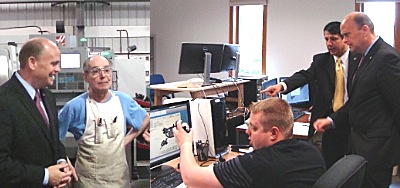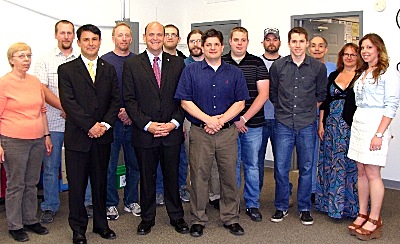- By Dan Veaner
- Business & Technology
 Print
Print  U. S. Congressman Tom Reed visited Advanced Design Consulting (ADC) in Lansing to learn about the custom-high-tech world wide business and its local workforce. Reed was treated to a tour of the facility Tuesday by ADC President Alex Deyhim and Director of operations Eric Van Every. He spent more time listening than talking, getting to know the company and its workers, who eagerly explained several of the projects they are working on.
U. S. Congressman Tom Reed visited Advanced Design Consulting (ADC) in Lansing to learn about the custom-high-tech world wide business and its local workforce. Reed was treated to a tour of the facility Tuesday by ADC President Alex Deyhim and Director of operations Eric Van Every. He spent more time listening than talking, getting to know the company and its workers, who eagerly explained several of the projects they are working on. "I can tell Alex and Eric are committed and I can tell you guys are committed to them," told the assembled employees. "To see so many younger folks standing here... that's my dream. Alex and Eric have demonstrated here that you can do it. And you're making it and you're selling it across the world. I'm excited about that and I wanted to come and see first hand how you are doing it. It's clear to me that it's you."
ADC custom builds tools for scientists. About 30% of the company's business is domestic with the rest international with projects. There are currently 21 employees. The building is plastered with posters showing various projects, past and present, that have been shipped all over the world. As engineers work at computers designing solutions, technicians work in the shop bringing them to reality.
"Scientists come up with these huge ideas, and then we are the ones who have to make it," says Director of operations Eric Van Every. "Our intelligence is with our people. We have engineers on the staff. We have a great work-staff of technicians, a machine shop. It's right here."
 Alex Deyhim (right) tells Tom Reed about an experimental radar test range that is being constructed in the Lansing facility for NASA, which will use it to test stealth technology
Alex Deyhim (right) tells Tom Reed about an experimental radar test range that is being constructed in the Lansing facility for NASA, which will use it to test stealth technologyOne such project is an experimental radar rest range that NASA will use to test stealth technology for its ability to evade radar. Pieces are being assembled in the shop including a large fin and an mechanical arm on which equipment will be mounted. In another room a technician is working out the best way to fit a circuit board into a very small space. A huge testing table is being crafted in another location.
Deyhim says the company loses contracts for two reasons. One is the size of the company, and the other is trade barriers imposed by foreign countries. He plans to address the size issue with a 20,000 square foot expansion that he says will bring new jobs to Lansing over a period of four or five years and into the future. He said ADC already has the skill set and the new building will bring more space to increase the machining and fabrication capacity.
"Once we put our expansion it will create even more jobs," Deyhim says. "But we have to make a commitment, and we committed to 12 jobs. We could potentially create tens or even hundreds down the road. There is a lot of possible growth. We have developed so much technology here for the last ten or twelve years... it's like the chicken and egg: we need the contracts and we need the space."
He showed Reed the future building site behind the existing facility. But when Reed, who co-chairs the House Manufacturing Caucus, asked what he could do in Washington to help the company Deyhim and Van Every told him that trade restrictions imposed by foreign countries put ADC at a disadvantage when bidding on jobs there.
"I will bring back this conversation about the trade barrier," Reed says. "How do we make sure that other countries are playing by the rules so that we're all competing on the same playing field? Because if that's the case, we win. We and America win every day, in my opinion. I'm going to bring this information back and develop this relationship so if they come across unfair barriers, that they know we're here to fight for them and open them up."
Reed asked whether other countries like China duplicate technology ADC produces and then make it themselves. Van Every says that is not a problem, because of the speed of developing technology.
"It doesn't matter," Van Every told him. "We're here. They're there. They will get here, but we will always be up here. As long as we keep stepping ahead it's not a problem. By the time they duplicate our 2010 models we're on the 2015 models."
Deyhim adds that ADC's skill set paired with developing intellectual property technology they produce unique.
"It's not just having a set of drawings or somebody reverse engineering," he says. "Most of what we do is one of a kind, so the skill set that we bring to the table is a big part of it."
Proud of his own deep family roots in Corning, Reed was clearly delighted to learn how many of the employees grew up in or near Lansing. Van Every, himself a Lansing High School graduate, says ADC often hires local people out of BOCES or trade schools and trains them in the specialized work the company does. He says investing in local people and training them in-house helps to make a solid company. Others have grown up in or near Lansing, then come back from earning engineering degrees to work here. That the company values its people was evident as they were introduced to Reed. He asked each where they were from and wanted to know how engineers got interested in what they now do for a living.
 Tom Reed meets tooling and die maker Jim Varga (left) and engineer Josh Stranger
Tom Reed meets tooling and die maker Jim Varga (left) and engineer Josh StrangerADC has been in business for about 18 years. After moving from a garage to a small office in the Cornell Business & Technology Park, the company built its original building on Ridge Road about 14 years ago. Just under a decade ago Deyhim considered moving the company to Oakridge, TN where he had acquired a large contract.
"We looked at it but it ultimately came down to the quality of life," he says. "We really like it here. We're five minutes from one of the best universities in the world. I like kayaking and biking. We like this area so we decided to stay put. Then five years ago we acquired some land because we were looking to move to Dryden. We decided not to."
Instead he expanded the 3,000 square foot building to 15,000, adding 16 employees over six years. Today he employs 26 people. He is now going forward with a new 20,000 square foot expansion that he says will bring new jobs to Lansing over a period of four or five years and into the future. The permits and financing are secured, and he says the building plans are being drawn up now.
"Lansing has been very good," Deyhim says. "They have been very helpful to us. It's a really home grown company. They see how we grow here, so they have provided all the support."
 The whole staff took time to meet with Congressman Reed for a brief talk and to pose for a picture. (Left to right) Rose Wright, Kane McAfee, Alex Deyhim, Rich Jayne, Congressman Tom Reed, Brandon DeRusso, Tim Shea, Eric Van Every, Josh Stranger, Chris Spencer, Cameron Adams, Jim Varga, Pam Hinshaw, Betsy Kemp
The whole staff took time to meet with Congressman Reed for a brief talk and to pose for a picture. (Left to right) Rose Wright, Kane McAfee, Alex Deyhim, Rich Jayne, Congressman Tom Reed, Brandon DeRusso, Tim Shea, Eric Van Every, Josh Stranger, Chris Spencer, Cameron Adams, Jim Varga, Pam Hinshaw, Betsy KempThat Deyhim has created a business that is not only successful on the international stage, but also maintains strong local roots resonated strongly with Reed. He said initiatives in Washington can help businesses like ADC continue to thrive using local talent.
"I am excited by U.S. manufacturing and this innovation bill," Reed says. "In particular, that we're pushing it to the finish line with the White House and the Senate with bipartisan, bicameral support. The workforce development component of it is critical. The skill sets that you see here with these young individuals and some not so young -- that is a competitive advantage that we have to promote and enhance."
v10i20
